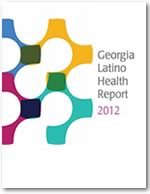
Lack of health insurance coverage among the Hispanic population in Georgia is much higher than the national average, according to an Emory University special report on the status of the health of the state's Latinos. Nearly half of the state's 850,000 Latinos are uninsured.
The report from researchers at Emory's Rollins School of Public Health (RSPH), in partnership with the Hispanic Health Coalition of Georgia, was released June 7 during the 2012 Latino Health Summit. It is a synthesis of data on the health status and outcomes of Georgia Hispanics and draws upon a wide range of indicators derived from the U.S. Census, federal and state health agencies, and a variety of health organizations and research studies.
The special report, the most comprehensive look at the health status of Georgia's Latinos to date, also shows that in 2010 two-thirds of Hispanic children in the state were born into what researchers called "mixed nativity" households, where they are U.S.-born and their parents are foreign-born.
"These mixed nativity families face particular challenges in terms of health status as well as health care access," says Karen Andes, assistant professor in the Hubert Department of Global Health at RSPH and principal investigator of the study.
"Latino children in this state have significantly lower access to health insurance than their black and white peers, and while they begin life with relatively good health, a number of indicators suggest that their health status has declined by the time they are old enough to start school."
The special Latino health report focuses on four key health areas: maternal child health, obesity and diabetes, cardiovascular diseases, cancer and behavioral health. Where sufficient data was available by race and ethnicity, the report highlights comparisons between the health of Georgia Hispanics and Hispanics nationwide, as well as differences between Hispanics and the non-Hispanic white and black populations in the state.
According to Andes, on the eve of health reform, the study findings confirm that extending insurance coverage to the entire Hispanic population would dramatically improve the health status of this population. Since employer-sponsored insurance is so much lower among Hispanics than other race/ethnic groups in the state, special care is needed to develop appropriate solutions, particularly in the occupational sectors – construction and service industries - where the Hispanic workforce is most concentrated.
"We hope the data this study provides will serve as a baseline from which future progress can be measured and it can also serve as a call to action to join together with the partners and sponsors of the Latino Health Summit to address key health issues among Georgia Latinos and contribute to a healthier Georgia," says Andes.
View the full Georgia Latino Health report (PDF 5.2 MB):

